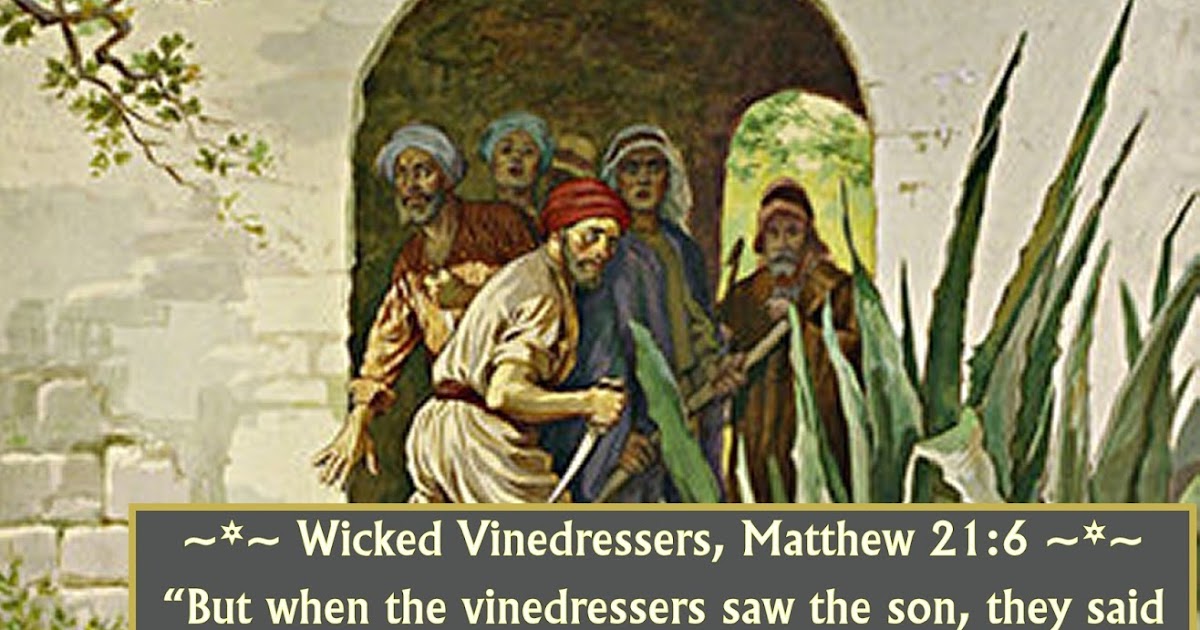The wicked vinedressers parable is a profound story that has transcended time, encapsulating themes of justice, responsibility, and divine retribution. This tale, originally told by Jesus, serves as a mirror reflecting the human condition and our interactions with authority and stewardship. Through the vivid imagery of a vineyard and its caretakers, the parable invites us to examine our roles in the world, especially as we navigate the complexities of ownership and accountability in our lives.
In this parable, the vineyard symbolizes God’s kingdom, and the vinedressers represent humanity’s stewardship over it. As we delve into the narrative, we uncover the underlying message that emphasizes the importance of recognizing our obligations and the consequences that arise when we fail to fulfill them. The wicked vinedressers, in their rebellion, portray a stark warning against the dangers of greed, pride, and the rejection of divine authority.
As we explore the rich layers of the wicked vinedressers parable, we will unravel the lessons it imparts about responsibility, faithfulness, and the ultimate accountability we hold before a higher power. Let us journey together through this ancient tale, seeking wisdom and understanding that remain relevant in our modern lives.
What is the Meaning of the Wicked Vinedressers Parable?
The wicked vinedressers parable is a narrative found in the Gospels, specifically in Matthew 21:33-46, Mark 12:1-12, and Luke 20:9-19. This parable tells of a landowner who plants a vineyard and leases it to vinedressers. When he sends his servants to collect his share of the fruits, the vinedressers mistreat and kill them. Finally, the landowner sends his son, believing they will respect him, but they kill him as well. This act of rebellion leads to the destruction of the vinedressers and the transfer of the vineyard to others.
Why Did Jesus Tell the Parable of the Wicked Vinedressers?
Jesus shared this parable as a direct critique of the religious leaders of His time. By using the vineyard as a metaphor for Israel and the vinedressers as its leaders, He illustrated their rejection of the prophets sent by God and foreshadowed His own impending crucifixion. The parable served as both a warning and a call to repentance, emphasizing that the leaders were accountable for their actions and would face severe consequences for their disobedience.
How Does the Wicked Vinedressers Parable Reflect Accountability?
Accountability is a central theme in the wicked vinedressers parable. The vinedressers are entrusted with the care of the vineyard, yet they choose to act selfishly and violently. This betrayal not only leads to their downfall but also highlights the importance of recognizing our responsibilities. The parable reminds us that we are all stewards of the gifts and resources entrusted to us, and our actions have consequences.
What Are the Consequences of Rebellion in the Parable?
The consequences faced by the wicked vinedressers are dire. Their refusal to honor the landowner results in their destruction and the loss of their position. This serves as a powerful reminder that rebellion against authority, particularly divine authority, leads to ruin. The parable invites us to reflect on our own lives and consider the potential repercussions of disobedience and neglect of our responsibilities.
How Can We Apply the Lessons from the Wicked Vinedressers Parable in Our Lives?
Reflecting on the wicked vinedressers parable, we can derive several key lessons applicable to our lives:
- Embrace Responsibility: Acknowledge the roles and responsibilities we hold in our families, communities, and workplaces.
- Practice Stewardship: Manage our resources and relationships wisely, recognizing that we are accountable for our actions.
- Honor Authority: Respect the structures of authority in our lives, whether in spiritual matters or societal norms.
- Seek Forgiveness: Understand that mistakes can happen, and seek to reconcile and make amends when necessary.
What Role Does Faith Play in Understanding the Wicked Vinedressers Parable?
Faith plays a crucial role in interpreting the wicked vinedressers parable. It invites us to trust in a higher power and recognize that our actions align with a greater purpose. By cultivating faith, we can better understand our responsibilities and the importance of living in accordance with divine principles. The parable encourages us to strengthen our relationship with God and to seek guidance in our stewardship of the world around us.
What Historical Context Surrounds the Wicked Vinedressers Parable?
The historical context of the wicked vinedressers parable is essential for understanding its depth. Jesus told this story during His final days in Jerusalem, a time marked by tension between Him and the religious authorities. The vineyard metaphor would have resonated deeply with His audience, drawing on the imagery from the Hebrew Scriptures, where Israel is often depicted as a vineyard. This context intensifies the message of accountability and the consequences of unfaithfulness.
How Does the Wicked Vinedressers Parable Connect to Modern Issues of Accountability?
In today's world, the wicked vinedressers parable remains relevant as it addresses contemporary issues of accountability and stewardship. Whether in leadership roles, environmental responsibility, or personal relationships, the parable serves as a reminder of the importance of honoring commitments and acknowledging the impact of our actions. As we navigate a complex world, the lessons embedded in this ancient tale can guide us toward responsible living and ethical decision-making.
Conclusion: What Can We Learn from the Wicked Vinedressers Parable?
The wicked vinedressers parable encapsulates timeless lessons about accountability, stewardship, and the gravity of our choices. As we reflect on this narrative, we are urged to embrace our responsibilities, honor those in authority, and understand that our actions have far-reaching consequences. This parable, rich in meaning and relevance, challenges us to live with intention, ensuring that we fulfill our roles as stewards of the world entrusted to us.
Article Recommendations
- Liza Weil
- Primetime Emmy Award For Outstanding Reality Program
- How Old Is Helena Vestergaard
- Robert James Ritchie Jr
- Younger Barbara Bush
- Yk Osiris And Diddy
- Finalists On Dancing With The Stars
- Carta Astral Donal Trump
- Goojara App
- Anime Character Male



